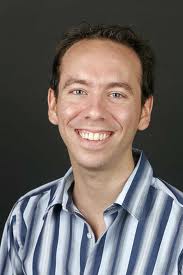Junior Faculty Teaching Fellow Spotlight:David Petrain
Each month, the CFT Newsletter highlights the work of our Junior Faculty Teaching Fellows. This month, David Petrain, Assistant Professor in the Department of Classical Studies, talks about his teaching philosophy and interests:
One of the most valuable and challenging characteristics of Classics as a discipline is its attempt to embrace the entire range of cultural phenomena through which the civilizations of ancient Greece and Rome manifest themselves: texts, images, material remains, religious institutions, economic transactions, social practices, appropriations in modern cultures–all are relevant. My research embraces different aspects of ancient culture by studying, e.g., how ancient poetry adapts expressive techniques from the visual arts and vice versa, and in my classes, too, I ask students to work with many different types of evidence.
“My courses on Latin and Greek literature and civilization always include activities meant to provoke students into making the material their own: when my students read Vergil’s Aeneid, for instance, I ask them to design their own versions of Aeneas’ divinely wrought shield that depicted all of Roman history, and to consider how different selections of historical events might alter the view of Rome’s past that Vergil presents.”
I hope for them to become alive to the possibility of investigating, interpreting, and integrating all aspects of the Classical world: the shocks of recognition and surprise at differences that they experience in their studies of ancient culture can help make them more discerning participants in their own. My courses on Latin and Greek literature and civilization always include activities meant to provoke students into making the material their own: when my students read Vergil’s Aeneid, for instance, I ask them to design their own versions of Aeneas’ divinely wrought shield that depicted all of Roman history, and to consider how different selections of historical events might alter the view of Rome’s past that Vergil presents. This year at CFT, I hope to explore new ways of encouraging creative and meaningful student participation in all my classes.


Leave a Response